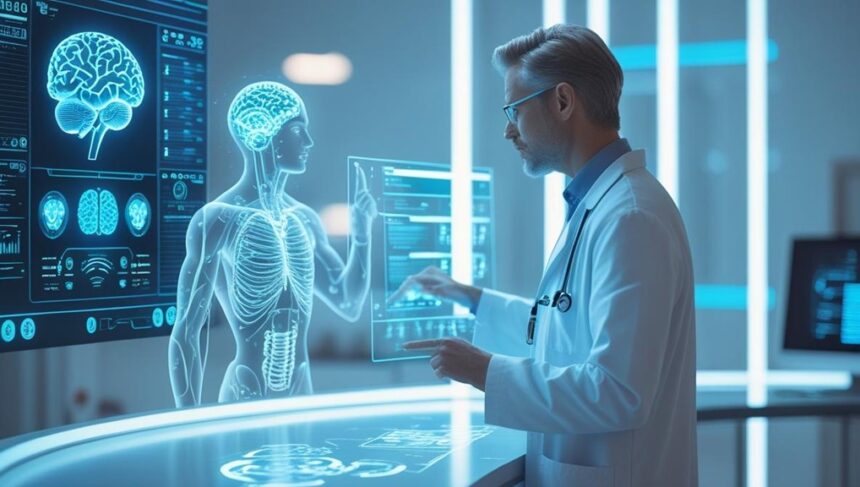In the hushed corridors of hospitals worldwide, a revolution is unfolding without fanfare. Artificial intelligence, once confined to the realm of science fiction, has stealthily embedded itself into the fabric of modern medicine, transforming healthcare delivery in ways both profound and subtle. From diagnostic imaging to drug discovery, AI technologies are redefining what’s possible in patient care—often without patients even realizing the extent of this technological intervention.
“We’re witnessing perhaps the most significant transformation in medical practice since the discovery of antibiotics,” explains Dr. Eliza Morgan, Chief of Digital Medicine at Toronto General Hospital. “The difference is that much of this AI revolution happens behind the scenes, invisible to the patient but increasingly indispensable to the physician.”
Recent data from the Canadian Medical Association reveals that AI applications in healthcare have grown by an astounding 300% since 2021, with radiology leading adoption rates. AI systems now analyze thousands of medical images daily across Canadian hospitals, detecting subtle abnormalities in tissue that might escape even the most experienced human eye.
Perhaps the most remarkable aspect of this technological shift is its capacity to democratize specialized care. Remote communities in northern territories now benefit from AI-powered diagnostic tools that can analyze everything from retinal scans to skin lesions, transmitting results to specialists in urban centers within minutes rather than the weeks patients previously waited.
“What we’re seeing is the beginning of geographic equalization in healthcare delivery,” notes health economist Dr. James Chen of the University of British Columbia. “AI doesn’t eliminate the need for specialists, but it extends their reach exponentially while simultaneously improving diagnostic accuracy.”
The economic implications are equally significant. According to a report from the Canadian Institute for Health Information, AI-driven efficiencies could reduce healthcare expenditures by approximately $4.7 billion annually by 2027, primarily through earlier disease detection and reduction in unnecessary procedures.
Pharmaceutical development has similarly been transformed. Traditional drug discovery typically consumed a decade and billions in investment before producing viable candidates. AI algorithms now screen millions of molecular compounds in days, identifying promising therapies for clinical trials at a fraction of the traditional cost. Toronto-based BioMatrix Pharma recently announced that its AI platform identified a novel treatment for resistant hypertension in just 14 months—a process that would have previously required 5-7 years.
Despite these advancements, the AI transition hasn’t been without controversy. Privacy advocates have raised legitimate concerns about the massive datasets of patient information being used to train these systems. A recent survey found that 68% of Canadians express concern about their medical data being used for AI training without explicit consent, highlighting a tension between technological progress and patient autonomy.
“The challenge is balancing innovation with appropriate safeguards,” explains Dr. Samantha Williams, ethics director at Canada’s Digital Health Institute. “We’re developing systems that can save countless lives, but we must ensure that patients’ rights aren’t sacrificed on the altar of technological progress.”
Another significant concern involves what experts call “algorithmic bias”—the potential for AI systems to perpetuate or even amplify existing healthcare disparities if they’re trained primarily on data from majority populations. Research published in the Canadian Medical Association Journal found that several widely-used diagnostic algorithms demonstrated reduced accuracy when applied to Indigenous populations, raising questions about equity in this new technological landscape.
Political leaders across party lines have recognized both the promise and peril of healthcare AI. The federal government recently announced a $240 million initiative to develop ethical frameworks and regulatory guidelines for medical AI systems, acknowledging that technology has outpaced governance in this rapidly evolving field.
Despite these challenges, the trajectory appears clear: artificial intelligence will continue its quiet transformation of medicine, gradually becoming as fundamental to healthcare as antibiotics or imaging technologies. The coming decade will likely see AI assistants becoming standard in clinical settings, providing real-time guidance to physicians during procedures, analyzing patient conversations for subtle diagnostic clues, and continuously monitoring patient data for early warning signs of deterioration.
As we navigate this new frontier where silicon and stethoscopes increasingly converge, one question remains particularly thought-provoking: In a medical world increasingly shaped by artificial intelligence, how do we preserve the uniquely human elements of healing while embracing the unprecedented capabilities these technologies offer?
























